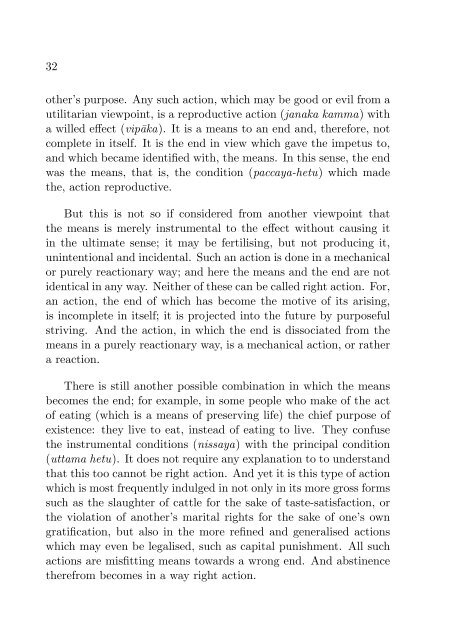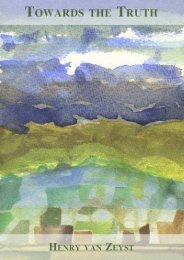Truth and the Way
The Noble Truths and the Way to realise them.
The Noble Truths and the Way to realise them.
You also want an ePaper? Increase the reach of your titles
YUMPU automatically turns print PDFs into web optimized ePapers that Google loves.
32<br />
o<strong>the</strong>r’s purpose. Any such action, which may be good or evil from a<br />
utilitarian viewpoint, is a reproductive action (janaka kamma) with<br />
a willed effect (vipāka). It is a means to an end <strong>and</strong>, <strong>the</strong>refore, not<br />
complete in itself. It is <strong>the</strong> end in view which gave <strong>the</strong> impetus to,<br />
<strong>and</strong> which became identified with, <strong>the</strong> means. In this sense, <strong>the</strong> end<br />
was <strong>the</strong> means, that is, <strong>the</strong> condition (paccaya-hetu) which made<br />
<strong>the</strong>, action reproductive.<br />
But this is not so if considered from ano<strong>the</strong>r viewpoint that<br />
<strong>the</strong> means is merely instrumental to <strong>the</strong> effect without causing it<br />
in <strong>the</strong> ultimate sense; it may be fertilising, but not producing it,<br />
unintentional <strong>and</strong> incidental. Such an action is done in a mechanical<br />
or purely reactionary way; <strong>and</strong> here <strong>the</strong> means <strong>and</strong> <strong>the</strong> end are not<br />
identical in any way. Nei<strong>the</strong>r of <strong>the</strong>se can be called right action. For,<br />
an action, <strong>the</strong> end of which has become <strong>the</strong> motive of its arising,<br />
is incomplete in itself; it is projected into <strong>the</strong> future by purposeful<br />
striving. And <strong>the</strong> action, in which <strong>the</strong> end is dissociated from <strong>the</strong><br />
means in a purely reactionary way, is a mechanical action, or ra<strong>the</strong>r<br />
a reaction.<br />
There is still ano<strong>the</strong>r possible combination in which <strong>the</strong> means<br />
becomes <strong>the</strong> end; for example, in some people who make of <strong>the</strong> act<br />
of eating (which is a means of preserving life) <strong>the</strong> chief purpose of<br />
existence: <strong>the</strong>y live to eat, instead of eating to live. They confuse<br />
<strong>the</strong> instrumental conditions (nissaya) with <strong>the</strong> principal condition<br />
(uttama hetu). It does not require any explanation to to underst<strong>and</strong><br />
that this too cannot be right action. And yet it is this type of action<br />
which is most frequently indulged in not only in its more gross forms<br />
such as <strong>the</strong> slaughter of cattle for <strong>the</strong> sake of taste-satisfaction, or<br />
<strong>the</strong> violation of ano<strong>the</strong>r’s marital rights for <strong>the</strong> sake of one’s own<br />
gratification, but also in <strong>the</strong> more refined <strong>and</strong> generalised actions<br />
which may even be legalised, such as capital punishment. All such<br />
actions are misfitting means towards a wrong end. And abstinence<br />
<strong>the</strong>refrom becomes in a way right action.
















